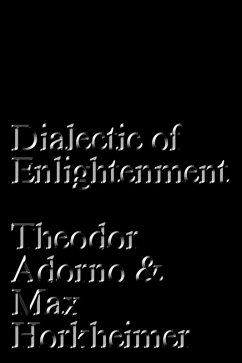Theodor Adorno and Max Horkheimer are the leading figures of the Frankfurt School and this book is their magnum opus. Dialectic of Enlightenment is one of the most celebrated works of modern social philosophy that continues to impress in its wide-ranging ambition.
Writing just after the Second World War and reflecting on the bureaucracy and myths of National Socialism and the inanity of the dawn of consumerism, Adorno and Horkheimer addressed themselves to a question which went to the very heart of the modern age: 'why mankind, instead of entering into a truly human condition, is sinking into a new kind of barbarism'. Modernity, far from redeeming the promises and hopes of the Enlightenment, had resulted in a stultification of mankind and administered society, characterised by simulation and candy-floss entertainment.
Tracing humanity's modern fall to the very rationality that was to be its liberation, the authors exposed the domination and violence that underpin the Enlightenment project.
Writing just after the Second World War and reflecting on the bureaucracy and myths of National Socialism and the inanity of the dawn of consumerism, Adorno and Horkheimer addressed themselves to a question which went to the very heart of the modern age: 'why mankind, instead of entering into a truly human condition, is sinking into a new kind of barbarism'. Modernity, far from redeeming the promises and hopes of the Enlightenment, had resulted in a stultification of mankind and administered society, characterised by simulation and candy-floss entertainment.
Tracing humanity's modern fall to the very rationality that was to be its liberation, the authors exposed the domination and violence that underpin the Enlightenment project.
Dieser Download kann aus rechtlichen Gründen nur mit Rechnungsadresse in A, D ausgeliefert werden.


